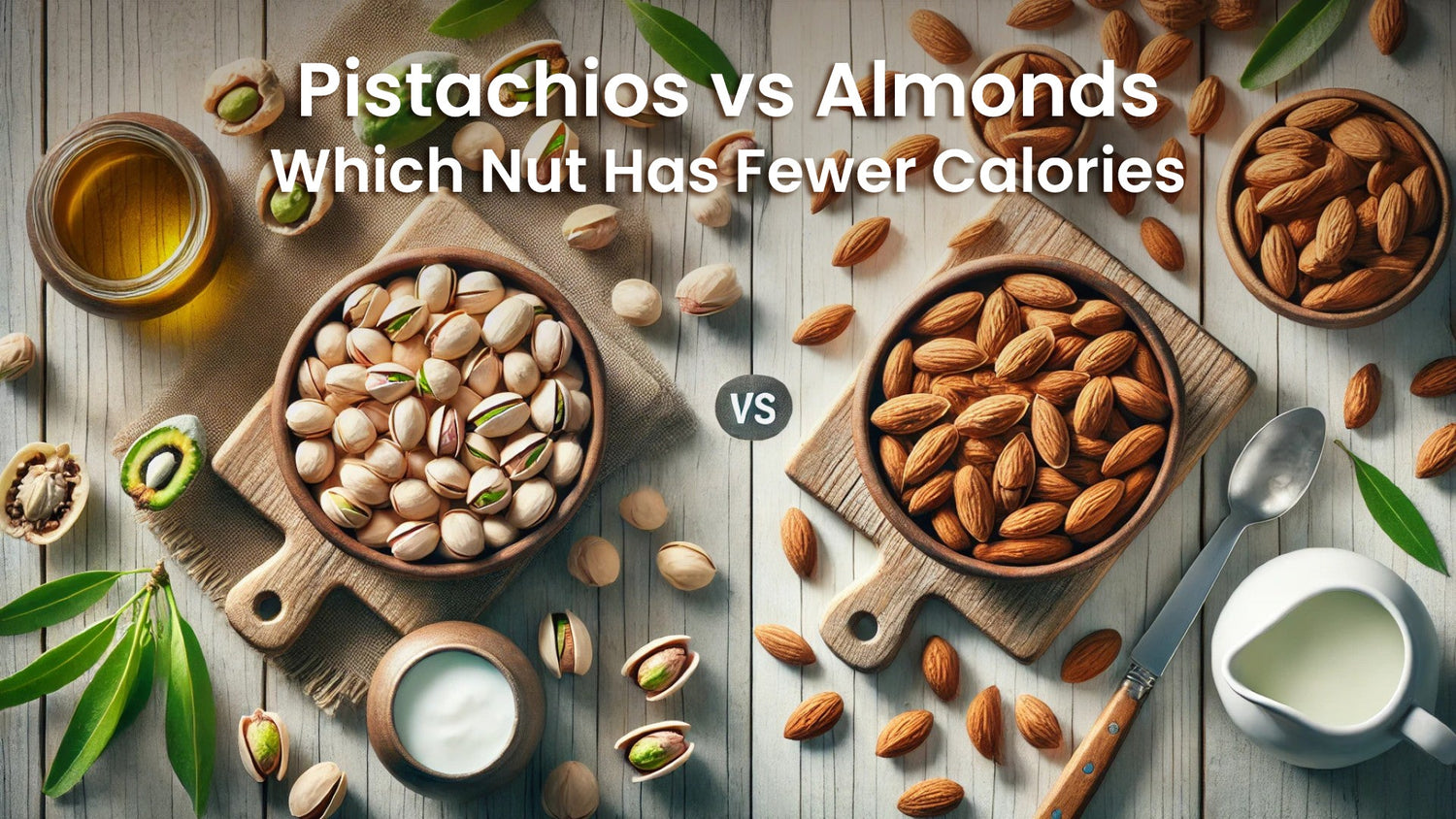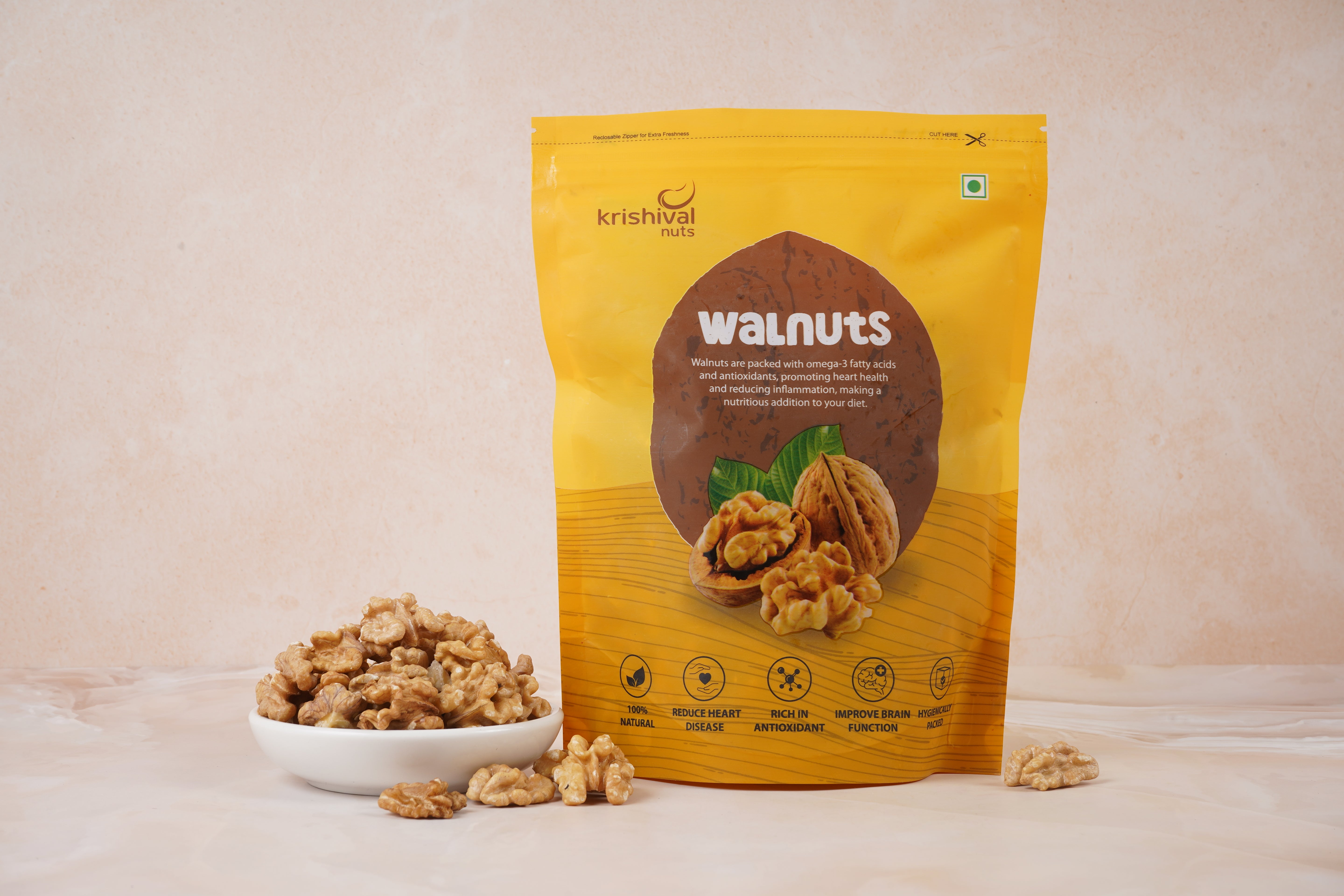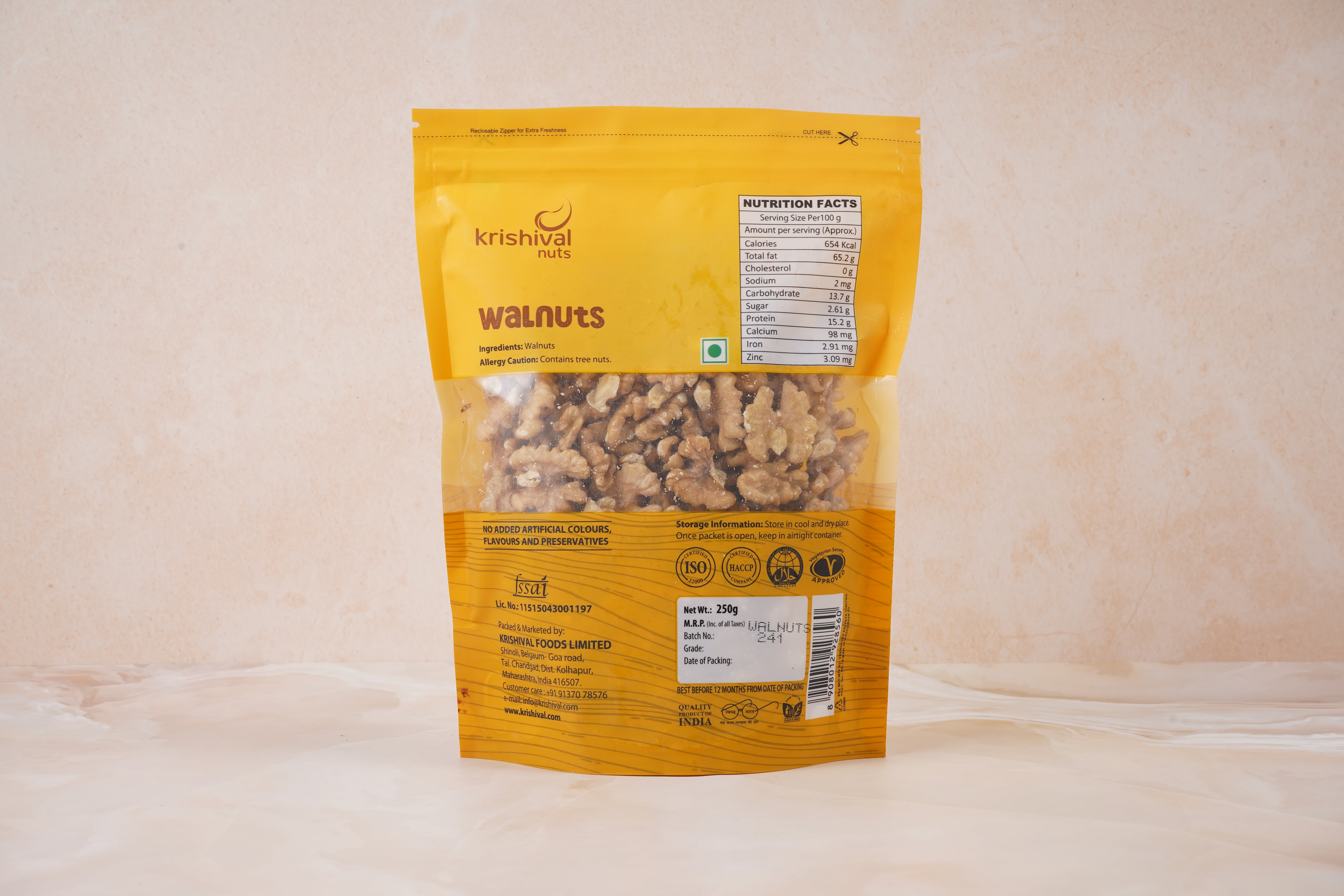Pistachios and almonds are two of the most popular nuts, known for their crunchy texture and nutrient-packed profiles. When choosing between these two, many people consider their calorie content, especially if they're looking to manage their weight while still enjoying a healthy snack. Both nuts offer numerous health benefits, but understanding which one has fewer calories can help you make a more informed decision, particularly if you’re focusing on calorie intake.
This article will compare the calorie content and nutritional benefits of pistachios and almonds, providing a clear picture of how they fit into your diet.
Table of Contents
-
Introduction
-
Nutritional Comparison: Pistachios vs Almonds
-
Health Benefits of Pistachios
-
Health Benefits of Almonds
-
Calorie Density: Which Nut Packs More Nutrients per Calorie?
-
Which Nut is Better for Weight Management?
-
How to Include Pistachios and Almonds in Your Diet
-
Conclusion
-
FAQs
H2 - Nutritional Comparison: Pistachios vs Almonds
Caloric Content of Pistachios
A one-ounce (28 grams) serving of pistachios contains about 160 calories. This relatively low calorie count makes pistachios a good choice for a snack if you're looking to control your calorie intake. Pistachios are also high in healthy fats, including monounsaturated and polyunsaturated fats, which are beneficial for heart health.
Nutritional breakdown of pistachios per ounce:
-
Protein: 6 grams
-
Fat: 13 grams (with about 9 grams being healthy fats)
-
Carbohydrates: 8 grams
-
Fiber: 3 grams
-
Vitamins and Minerals: Pistachios are a good source of vitamin B6, thiamine, potassium, and magnesium, supporting overall metabolic health, muscle function, and heart health.
Caloric Content of Almonds
Almonds contain approximately 164 calories per ounce (28 grams), making them slightly higher in calories compared to pistachios. However, almonds are still a nutrient-dense snack, rich in healthy fats and vitamins, particularly vitamin E, which has antioxidant properties.
Nutritional breakdown of almonds per ounce:
-
Protein: 6 grams
-
Fat: 14 grams (with about 9 grams being monounsaturated fats)
-
Carbohydrates: 6 grams
-
Fiber: 3.5 grams
-
Vitamins and Minerals: Almonds are packed with vitamin E, magnesium, and calcium, which contribute to heart health, bone strength, and overall well-being.
Although both pistachios and almonds are relatively low in calories and rich in healthy fats, almonds have a slightly higher calorie count. The differences in fat types and nutrient composition also contribute to their unique health benefits, which we will explore further in the upcoming sections.
H2 - Health Benefits of Pistachios
Pistachios are not only a delicious snack but also pack a punch when it comes to nutritional benefits. Here are some key health benefits:
-
Rich in Antioxidants
Pistachios are a great source of antioxidants, such as lutein and zeaxanthin, which help protect your cells from oxidative stress and reduce the risk of chronic diseases like heart disease and diabetes. These antioxidants are particularly beneficial for eye health, as they help prevent age-related macular degeneration. -
Supports Heart Health
Pistachios are heart-healthy nuts due to their high content of monounsaturated fats, which help lower bad cholesterol (LDL) levels. Additionally, the antioxidants and fiber in pistachios contribute to improved blood vessel function, lower blood pressure, and a reduced risk of heart disease. -
High in Fiber
Pistachios contain a good amount of fiber, around 3 grams per ounce. Fiber is important for digestion, as it promotes regular bowel movements and supports a healthy gut. It also helps in controlling blood sugar levels by slowing the absorption of sugar into the bloodstream. -
Protein-Rich
Pistachios are a great source of plant-based protein, providing about 6 grams of protein per ounce. Protein is essential for muscle repair, growth, and overall body function. As a plant-based source, pistachios are a good option for vegetarians and vegans looking to increase their protein intake. -
Weight Management
Despite being calorie-dense, pistachios may help with weight management. The combination of healthy fats, fiber, and protein in pistachios promotes satiety, helping you feel full for longer. Eating pistachios in moderation can prevent overeating and support healthy weight loss. -
Rich in Minerals
Pistachios provide important minerals like potassium, magnesium, and phosphorus, which help support various body functions, including maintaining healthy bones, muscles, and fluid balance. These minerals also play a crucial role in supporting the nervous and cardiovascular systems.
H2 - Health Benefits of Almonds
Almonds are another nutrient-packed nut that provides a wide range of health benefits. Here are the key advantages:
-
Good for Heart Health
Almonds are rich in monounsaturated fats, which are known to help reduce LDL cholesterol levels and improve heart health. Studies show that regular almond consumption can lower the risk of heart disease by improving cholesterol levels, blood pressure, and overall cardiovascular function. -
Supports Weight Loss
Almonds can be a great addition to a weight-loss plan. Despite being high in calories, almonds are rich in fiber and protein, both of which promote satiety and reduce hunger. Eating almonds as a snack can help control appetite and prevent overeating, ultimately supporting weight management. -
Rich in Vitamin E
Almonds are an excellent source of Vitamin E, a powerful antioxidant that helps protect cells from damage. Vitamin E plays a role in maintaining healthy skin, improving skin elasticity, and preventing premature aging. It also supports the immune system and reduces inflammation in the body. -
Helps Regulate Blood Sugar
Almonds are known to help regulate blood sugar levels, particularly for people with type 2 diabetes. The healthy fats, fiber, and magnesium in almonds help improve insulin sensitivity and prevent blood sugar spikes. Including almonds in your diet may contribute to better blood sugar control and overall metabolic health. -
Supports Bone Health
Almonds are a rich source of calcium, an essential mineral for bone health. In addition to calcium, almonds also provide magnesium and phosphorus, which contribute to strong bones and teeth. Eating almonds regularly can help prevent bone-related issues like osteoporosis, particularly in individuals who do not consume dairy products. -
Brain Health
Almonds are beneficial for brain health due to their high content of vitamin E, which has been linked to improved cognitive function. The antioxidants in almonds help protect brain cells from oxidative stress, potentially lowering the risk of age-related cognitive decline and improving memory and concentration.
H3 -Calorie Density: Which Nut Packs More Nutrients per Calorie?
When considering a healthy snack, it's not just about the number of calories but also about how nutrient-dense those calories are. Calorie density refers to the amount of nutrients a food provides relative to its calorie content. In other words, the goal is to get more vitamins, minerals, and fiber for fewer calories. Let’s break down the calorie density of pistachios and almonds to see which one offers more nutrients per calorie.
-
Pistachios:
Pistachios provide about 160 calories per ounce (approximately 49 kernels). Despite their relatively high-calorie count, pistachios are packed with protein, fiber, and antioxidants, which contribute to their nutrient density. Each ounce offers about 6 grams of protein, 3 grams of fiber, and a range of vitamins such as vitamin B6 and thiamine, along with minerals like potassium and phosphorus. The high protein and fiber content help to increase satiety, making pistachios a great choice for a filling snack. -
Almonds:
Almonds are slightly higher in calories, providing about 164 calories per ounce (approximately 23 almonds). Almonds offer 6 grams of protein, 3.5 grams of fiber, and are rich in vitamin E, which is a potent antioxidant. They also provide a good amount of magnesium, which is important for muscle function and energy production. Though almonds are slightly higher in calories, they are nutrient-packed, especially when it comes to antioxidants and heart-healthy fats.
Verdict:
Both pistachios and almonds are nutrient-dense, but almonds might offer a slightly better nutrient-to-calorie ratio due to their high levels of antioxidants (especially vitamin E). However, pistachios pack more protein per calorie, which makes them a better choice for a protein boost. Ultimately, both nuts are excellent sources of essential nutrients, and the decision depends on your specific nutritional needs.
H2 -Which Nut is Better for Weight Management?
When it comes to weight management, the choice of snacks can significantly impact your overall calorie intake and satiety levels. Nuts are often considered a good option for weight management due to their balance of healthy fats, fiber, and protein, which contribute to prolonged fullness and reduced overeating. However, some nuts may be more effective than others based on their calorie content and macronutrient composition. Let's look at pistachios and almonds to determine which one is better suited for weight management.
-
Pistachios:
Pistachios are often considered a weight-friendly nut due to their relatively lower calorie content per serving compared to other nuts. One of the key factors contributing to pistachios' effectiveness for weight management is their high protein and fiber content, which helps to curb hunger. Studies have shown that people who snack on pistachios tend to consume fewer calories overall due to the increased feeling of fullness. Moreover, pistachios are often eaten in their shells, which slows down the eating process and increases mindful eating, further aiding in portion control. -
Almonds:
Almonds, while slightly higher in calories than pistachios, are still a great option for weight management due to their high fiber and protein content. Almonds have been shown to support weight loss and maintenance by reducing appetite and increasing satiety. The presence of healthy fats (particularly monounsaturated fats) in almonds also plays a role in helping to regulate blood sugar levels and reduce hunger spikes. However, because almonds are calorie-dense, it is essential to be mindful of portion sizes. A serving size of almonds, generally one ounce, is sufficient to provide satisfying fullness without overconsumption.
Verdict:
For weight management, pistachios may have a slight edge due to their lower calorie content, higher protein-to-calorie ratio, and the fact that they are typically consumed in their shells, which encourages mindful eating and portion control. However, almonds are also an excellent choice, especially when consumed in moderation, thanks to their fiber and healthy fats, which help control appetite and keep you feeling full for longer. Both nuts are beneficial for weight management, and including them in a balanced diet can help achieve or maintain a healthy weight.
H2 -How to Include Pistachios and Almonds in Your Diet
Incorporating pistachios and almonds into your daily diet is simple and can enhance both the taste and nutritional value of your meals. Here are some easy ways to add these nutrient-dense nuts to your diet:
-
As a Snack: Enjoy a handful of pistachios or almonds as a quick, satisfying snack between meals. Both nuts are rich in fiber and healthy fats, which help curb hunger and provide sustained energy throughout the day.
-
In Smoothies: Add a tablespoon of ground almonds or a handful of pistachios to your smoothies. These nuts blend well and add a creamy texture, while also boosting the protein and fiber content.
-
In Salads: Sprinkle chopped almonds or pistachios on your salads for an extra crunch and a burst of flavor. Both nuts pair wonderfully with leafy greens, fruits, and light dressings.
-
Baked Goods: Add chopped pistachios or almonds to muffins, cookies, or granola bars. They can replace or complement other ingredients, making your baked goods more nutritious.
-
Yogurt Topping: Top your morning yogurt with pistachios or almonds. Adding nuts to yogurt increases the protein content and provides healthy fats that help keep you full longer.
-
In Cereal or Oatmeal: Stir in chopped almonds or pistachios into your cereal or oatmeal for an extra layer of texture and nutrients. These nuts are a great source of vitamins and minerals to start your day right.
These are just a few simple ideas for including pistachios and almonds in your meals. By doing so, you can enjoy their many health benefits while also indulging in their delicious flavors.
H3 -Conclusion
Pistachios and almonds are both excellent additions to a healthy diet, offering a variety of nutrients with relatively low calorie content. While almonds are rich in vitamin E and offer a slightly higher amount of protein, pistachios are lower in calories and provide a more balanced fat profile, including heart-healthy omega-3s. By incorporating these nuts into your diet through snacks, smoothies, or baked goods, you can enjoy their many benefits, from improving heart health to aiding in weight management. For premium quality, natural nuts, Krishival offers a variety of pistachios and almonds that are perfect for enhancing your diet and overall well-being.
H4 - FAQs
-
How many calories are in a serving of pistachios?
One ounce (28 grams) of pistachios contains approximately 159 calories. This makes them a calorie-dense but nutritious snack. -
How many calories are in a serving of almonds?
A one-ounce serving (28 grams) of almonds contains around 164 calories. While slightly higher than pistachios, they are rich in healthy fats and protein. -
Which nut has more fiber, pistachios or almonds?
Almonds contain more fiber than pistachios. One ounce of almonds provides about 3.5 grams of fiber, whereas pistachios offer about 2.9 grams per ounce. -
Which nut is better for weight loss, pistachios or almonds?
Both nuts are excellent for weight management, but pistachios have a slight edge due to their lower calorie content. The higher fiber content in almonds, however, can also help with satiety and controlling appetite. -
Are pistachios or almonds better for heart health?
Both nuts are heart-healthy, but almonds are particularly rich in vitamin E, which acts as an antioxidant. Pistachios also support heart health with their omega-3 fatty acids, making both a great choice for cardiovascular health. -
Can I eat pistachios or almonds every day?
Yes, you can eat both nuts daily in moderation. A small serving (1 ounce) of either pistachios or almonds each day can contribute to your overall health without exceeding calorie requirements. -
Which nut is better for controlling blood sugar levels?
Almonds are especially beneficial for blood sugar control due to their low glycemic index and high fiber content. Pistachios, with their balance of protein and healthy fats, also provide benefits in managing blood sugar. -
How can I include pistachios and almonds in my diet without adding too many calories?
You can limit portions to a small handful (about 28 grams) and incorporate them into meals like salads, smoothies, or yogurt toppings. Both nuts are nutrient-dense, so even small servings can provide health benefits. -
Do pistachios or almonds provide more protein?
Almonds have slightly more protein than pistachios. One ounce of almonds offers about 6 grams of protein, while pistachios provide around 5.8 grams per ounce. -
Are there any significant differences in vitamins and minerals between pistachios and almonds?
Yes, almonds are particularly high in vitamin E, while pistachios contain higher levels of potassium and vitamin B6. Both nuts provide essential minerals like magnesium and calcium, making them highly nutritious options for overall health.









